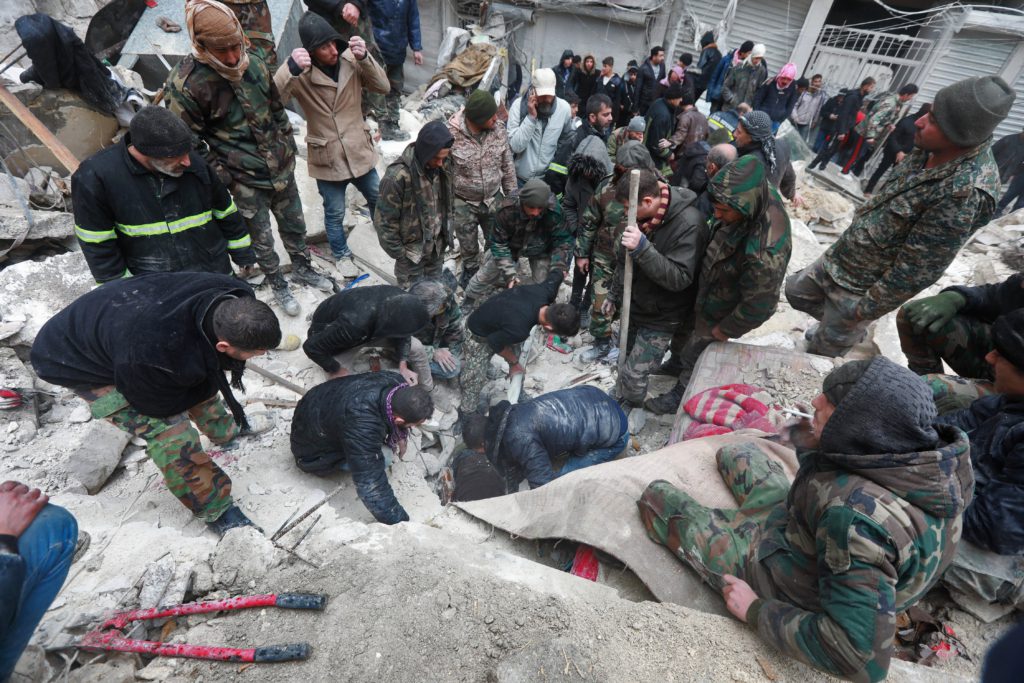SYRIA: ALEPPO AUTHORITIES MUST ENSURE THAT BUILDING SAFETY MEASURES DO NOT RESULT IN FORCED EVICTIONS AND HOMELESSNESS
Lunes, 4 de septiembre de 2023
The Syrian authorities must ensure that the right to housing of residents of earthquake-affected residential buildings in Aleppo are guaranteed, Amnesty International said today, amid concerns about unlawful demolitions of buildings deemed unsafe as a result of the 6 February earthquakes and reports of bureaucratic obstacles for those seeking to repair their damaged homes.
“Several months have passed since thousands of people in Aleppo lost their homes or suffered damage to the buildings they live in, during the earthquakes. We are concerned that the manner in which building-safety measures are being carried out may be adding to the difficulties faced by thousands of earthquake survivors,” said Diana Semaan, Amnesty International’s Syria researcher.
“The Syrian authorities should focus their efforts on respecting people’s right to adequate housing. Demolishing residential buildings without proper explanation or due process is a violation of international human rights law and standards. The authorities have an obligation to consult with residents and provide reasonable notice and financial compensation or alternative housing to ensure that no one is rendered homeless, prior to conducting demolitions.”
Demolishing residential buildings without proper explanation or due process is a violation of international human rights law and standards.
Diana Semaan, Amnesty International’s Syria researcher
Between April 2023 and July 2023, Amnesty International interviewed three humanitarian workers who visited Aleppo after the earthquakes, as well as six residents living in Aleppo city, and reviewed media articles and UN reports. Amnesty International’s Crisis Evidence Lab also verified videos of demolitions in Aleppo city.
Even before the earthquakes, Aleppo had suffered widespread damage due to the Syrian and Russian forces’ unlawful bombing campaign between 2012 and 2016. In 2016, the Syrian government took control of eastern Aleppo, a formerly opposition-held area of the city, after subjecting tens of thousands of civilians to siege and bombardment, leading to their forcible displacement to other opposition-held areas in northern Syria.
Concerns about unlawful demolitions
On 20 February 2023, the governor of Aleppo stated that 13,000 families were impacted by the earthquakes. He added that 11,551 buildings were inspected, after which 220 were demolished, citing public safety reasons, while 303 were awaiting demolition.
In an interview with a government-affiliated media outlet, an engineer explained that the authorities will immediately demolish a building after an engineering committee, formed by the authorities to assess the structural safety of buildings, labels it “red”, which means it presents a danger to public safety and, as a result, people are asked to evacuate.
However, Amnesty International has received information from residents and humanitarian workers that these assessments may not be meticulously carried out and that the demolitions are being carried out in the absence of due process requirements and safeguards against forced evictions as per international human rights standards.

Humanitarian workers, as well as three residents, told Amnesty International that many of these committees have only been conducting visual assessments, which lack the precise detail required to determine the safety of a building – and may lead to unwarranted demolitions. They also added that residents are unable to challenge the committees’ decisions and are often not given enough time to remove their belongings.
Residents told Amnesty International that in many cases, people whose homes have been demolished because they have been deemed unsafe for habitation are not being offered alternative housing or compensation. This is also of particular concern since in April, the UN reported that the government was closing the majority of temporary shelters that were used to provide emergency accommodation for people who lost their homes in the earthquakes.
International human rights standards on the right to housing clarify that even where eviction is justified, it should be carried out in strict compliance with international human rights law. Authorities must therefore engage residents of unsafe buildings in genuine consultation on the demolition and resettlement options, provide them with adequate information about plans, adequate written notice of evictions, and adequate alternative housing, and compensation for losses. They must ensure that no one is left homeless and vulnerable to other human rights violations as a result of the demolitions.
Obstacles to repairs
Residents whose homes were damaged by the earthquakes told Amnesty International that the authorities failed to inform them how to contact the committees to inquire about their homes’ safety.
They said that in addition to receiving no financial support from the authorities to repair their damaged homes, the authorities also required permits, which were difficult to obtain, for residents to rehabilitate residential buildings.

These permits are especially difficult to secure to repair informal buildings, which constitute the majority of buildings in the areas damaged by the earthquakes. According to a report published by International Crisis Group in 2022, “only those with the ear of power – security forces or militias – can secure infrmal permission to make repairs.”
“Instead of imposing onerous bureaucratic requirements on residents trying to repair their earthquake-damaged homes, the Syrian authorities should ensure that all residents are provided with adequate technical and financial support, without discrimination.
Diana Semaan, Amnesty International’s Syria researcher
A resident from Sheikh Maqsoud, a neighbourhood in Aleppo under blockade by the Syrian government, said that the government prevented or restricted aid from entering the area. In addition, government security checkpoints at the entrance have imposed high fees and taxes on those bringing in construction materials to help people rebuild their homes.
“Instead of imposing onerous bureaucratic requirements on residents trying to repair their earthquake-damaged homes, the Syrian authorities should ensure that all residents are provided with adequate technical and financial support, without discrimination”, said Diana Semaan
Tags: SYRIA, HUMAN RIGHTS, LIBERTY OF EXPRESSION.